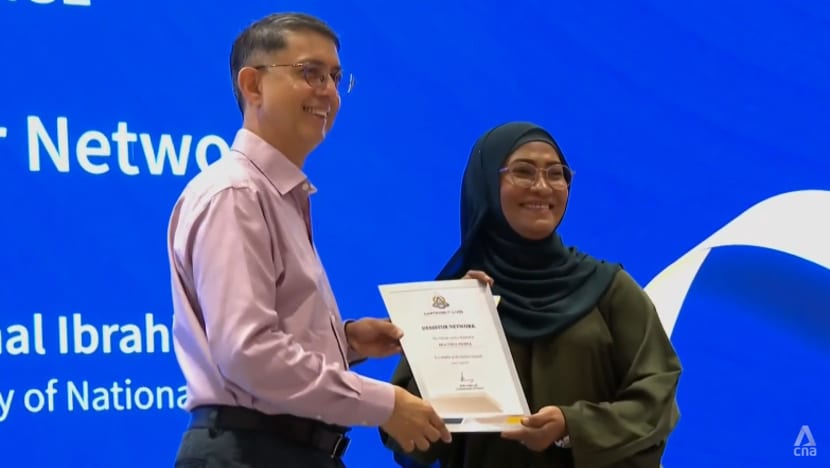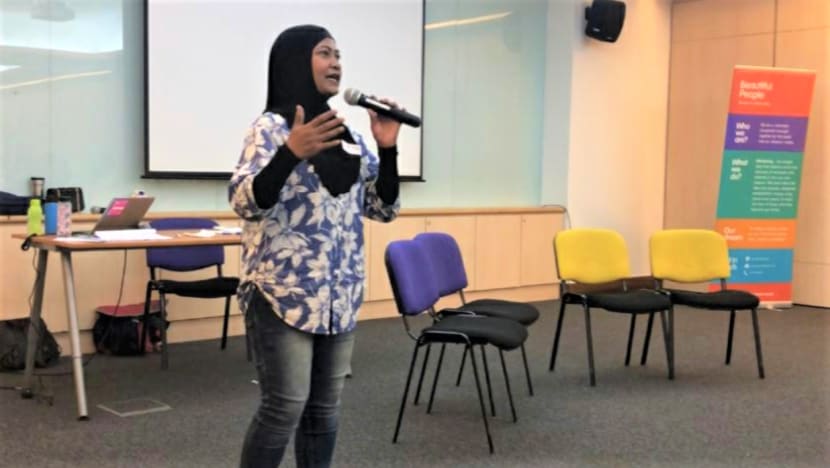New initiative helps ex-convicts reintegrate into society with support from former inmates
The initiative comes on the back of worrying Singapore Prison Service statistics that show four in 10 offenders returning to jail within five years of release.

Minister of State for Home Affairs Muhammad Faishal Ibrahim presents Ms Norli Ismail with a letter welcoming non-profit organisation Beautiful People to the Desistor Network.
SINGAPORE: Ms Norli Ismail has led a drug-free life since her release from prison nine years ago.
The 44-year-old has worked hard to remain on the straight and narrow and rebuild her relationship with her children.
“I have kids who keep a distance from me, who don't wish to talk to me. I have to keep persuading (my son) and ask him to go out with me. It is hard but manageable,” she said.
“I used to get caught in front of them… (My children) ask ‘When you go out, will you come back?’ Because sometimes they fear when their mum goes out, she never comes back. She will return home years later.”
But those days are squarely in her past for the former drug offender. Today, Ms Norli is a mentor with the Desistor Network, a newly-minted initiative by the Singapore Prison Service (SPS) to help ex-convicts better reintegrate into society.
With partnership from 53 community agencies and counting, the network aims to help past offenders desist from further crimes by offering training opportunities, mentorship programmes and a network of support.
The initiative comes on the back of worrying SPS statistics that show four in 10 offenders returning to prison within five years of release.
SUPPORT FROM EX-OFFENDERS
The network raises awareness of the various avenues of help available, and creates an ecosystem of understanding and peer support between community partners, offenders, and desistors – ex-convicts who have successfully remained offence-free.
“Inmates and ex-offenders will be able to relate to their life experiences, making the desistors a powerful source of inspiration,” said Minister of State for Home Affairs Muhammad Faishal Ibrahim during the launch of the initiative on Friday (Apr 15).
“Through mutual exchange and sharing of life experiences, we believe the desistors can sustain their motivation, strengthen their conviction, and cultivate positive mindsets and attitudes that are key to long-term desistance.”
Another former inmate-turned-mentor is Mr David King Thorairajan from charity organisation Singapore After-Care Association.
The volunteer noted he has seen inmates and ex-offenders struggle to maintain close relationships with their loved ones, and said they need a boost in their self-esteem to prevent them from reoffending.
“I hope to encourage others in need as I was once in their shoes,” said Mr Thorairajan, adding he wants to motivate mentees in coaching, business empowerment and relationship strengthening.
COUNSELLING AND JOBS
Partner agencies have committed to providing various forms of support for ex-offenders, including counselling and job placements.
For instance, Pertapis Halfway House provides rehabilitation programmes while inmates are still in prison to prepare them to rebuild their lives after release. Social enterprise Findjobs will help former convicts look for jobs in a fast and efficient way.

For many ex-convicts, the struggle to land a job is real. A prevalence of discrimination and stigma has made it difficult for former inmates to find gainful employment.
Ms Norli recounted the joy of getting hired after being freed from jail, only to be fired three days later when her employer found out she is an ex-offender.
“I was really heartbroken, I felt so discriminated against,” she said.
“My biggest struggle was (finding) a job. When we are released from prison the first thing we want to do is get ourselves a stable job to financially support ourselves.”
Hence, organisations and initiatives providing prison aftercare are crucial for ex-inmates to rejoin the workforce and lower the chances of re-offending, Ms Norli said.
Non-profit organisation Beautiful People helped her get back on her feet and linked her to various other charities.
“(They helped me) see the values that are still in me … I don't feel demoralised … whenever I have achievements I’m motivated to do better and better.”
MORE HELP ON THE WAY
The Desistor Network is using a new Telegram channel to connect ex-offenders to suitable agencies, and there are plans to develop an app to improve this support.

Other programmes are also in the pipeline.
“Currently, in prisons, we have our counsellors and psychologists conducting the relevant programmes for our inmates,” said Mr Ong Choon Yong, senior assistant director of SPS' rehabilitation and reintegration division.
“In the longer run, we hope to see desistors with the proper qualification to come into the prisons to conduct these courses for our inmates.”
With more agencies and mentors set to join the programme, the hope is that more ex-offenders will seize opportunities to turn over a new leaf.
Ms Norli, who gives inspirational talks at schools and juvenile homes in her role as a mentor, said being part of the Desistor Network is an achievement to her. She hopes her work can motivate and inspire fellow ex-offenders.
“Most ex-offenders feel hopeless. They feel like they have no values or morals in life. That mindset (has to change). Don't feel hopeless. They have to embrace every moment, be it a good one or a bad one,” she said.


















